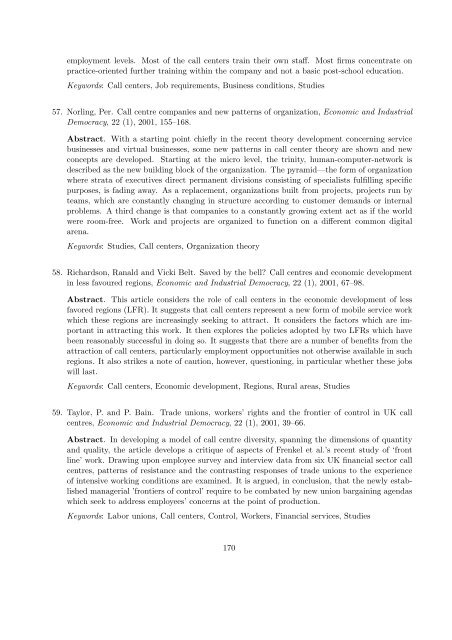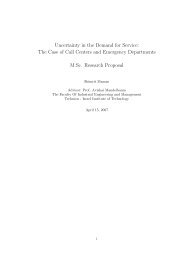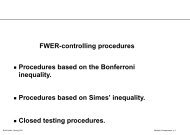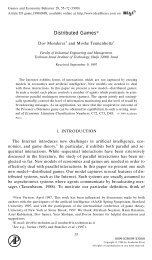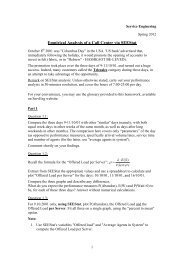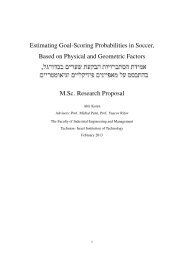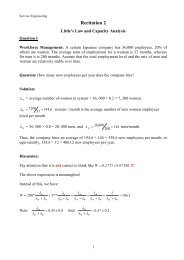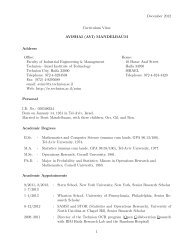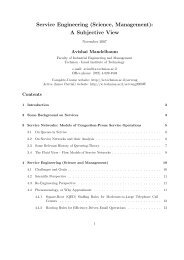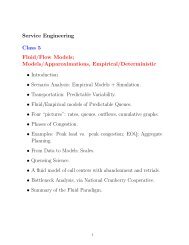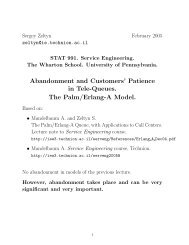CALL CENTERS (CENTRES) - Faculty of Industrial Engineering and ...
CALL CENTERS (CENTRES) - Faculty of Industrial Engineering and ...
CALL CENTERS (CENTRES) - Faculty of Industrial Engineering and ...
You also want an ePaper? Increase the reach of your titles
YUMPU automatically turns print PDFs into web optimized ePapers that Google loves.
employment levels. Most <strong>of</strong> the call centers train their own staff. Most firms concentrate on<br />
practice-oriented further training within the company <strong>and</strong> not a basic post-school education.<br />
Keywords: Call centers, Job requirements, Business conditions, Studies<br />
57. Norling, Per. Call centre companies <strong>and</strong> new patterns <strong>of</strong> organization, Economic <strong>and</strong> <strong>Industrial</strong><br />
Democracy, 22 (1), 2001, 155–168.<br />
Abstract. With a starting point chiefly in the recent theory development concerning service<br />
businesses <strong>and</strong> virtual businesses, some new patterns in call center theory are shown <strong>and</strong> new<br />
concepts are developed. Starting at the micro level, the trinity, human-computer-network is<br />
described as the new building block <strong>of</strong> the organization. The pyramid—the form <strong>of</strong> organization<br />
where strata <strong>of</strong> executives direct permanent divisions consisting <strong>of</strong> specialists fulfilling specific<br />
purposes, is fading away. As a replacement, organizations built from projects, projects run by<br />
teams, which are constantly changing in structure according to customer dem<strong>and</strong>s or internal<br />
problems. A third change is that companies to a constantly growing extent act as if the world<br />
were room-free. Work <strong>and</strong> projects are organized to function on a different common digital<br />
arena.<br />
Keywords: Studies, Call centers, Organization theory<br />
58. Richardson, Ranald <strong>and</strong> Vicki Belt. Saved by the bell? Call centres <strong>and</strong> economic development<br />
in less favoured regions, Economic <strong>and</strong> <strong>Industrial</strong> Democracy, 22 (1), 2001, 67–98.<br />
Abstract. This article considers the role <strong>of</strong> call centers in the economic development <strong>of</strong> less<br />
favored regions (LFR). It suggests that call centers represent a new form <strong>of</strong> mobile service work<br />
which these regions are increasingly seeking to attract. It considers the factors which are important<br />
in attracting this work. It then explores the policies adopted by two LFRs which have<br />
been reasonably successful in doing so. It suggests that there are a number <strong>of</strong> benefits from the<br />
attraction <strong>of</strong> call centers, particularly employment opportunities not otherwise available in such<br />
regions. It also strikes a note <strong>of</strong> caution, however, questioning, in particular whether these jobs<br />
will last.<br />
Keywords: Call centers, Economic development, Regions, Rural areas, Studies<br />
59. Taylor, P. <strong>and</strong> P. Bain. Trade unions, workers’ rights <strong>and</strong> the frontier <strong>of</strong> control in UK call<br />
centres, Economic <strong>and</strong> <strong>Industrial</strong> Democracy, 22 (1), 2001, 39–66.<br />
Abstract. In developing a model <strong>of</strong> call centre diversity, spanning the dimensions <strong>of</strong> quantity<br />
<strong>and</strong> quality, the article develops a critique <strong>of</strong> aspects <strong>of</strong> Frenkel et al.’s recent study <strong>of</strong> ‘front<br />
line’ work. Drawing upon employee survey <strong>and</strong> interview data from six UK financial sector call<br />
centres, patterns <strong>of</strong> resistance <strong>and</strong> the contrasting responses <strong>of</strong> trade unions to the experience<br />
<strong>of</strong> intensive working conditions are examined. It is argued, in conclusion, that the newly established<br />
managerial ’frontiers <strong>of</strong> control’ require to be combated by new union bargaining agendas<br />
which seek to address employees’ concerns at the point <strong>of</strong> production.<br />
Keywords: Labor unions, Call centers, Control, Workers, Financial services, Studies<br />
170


